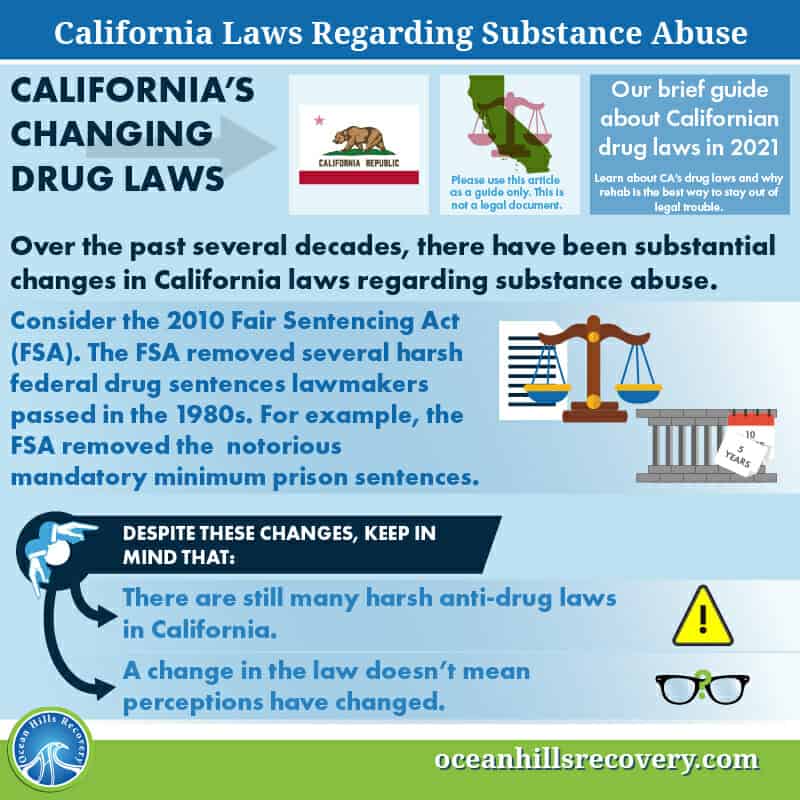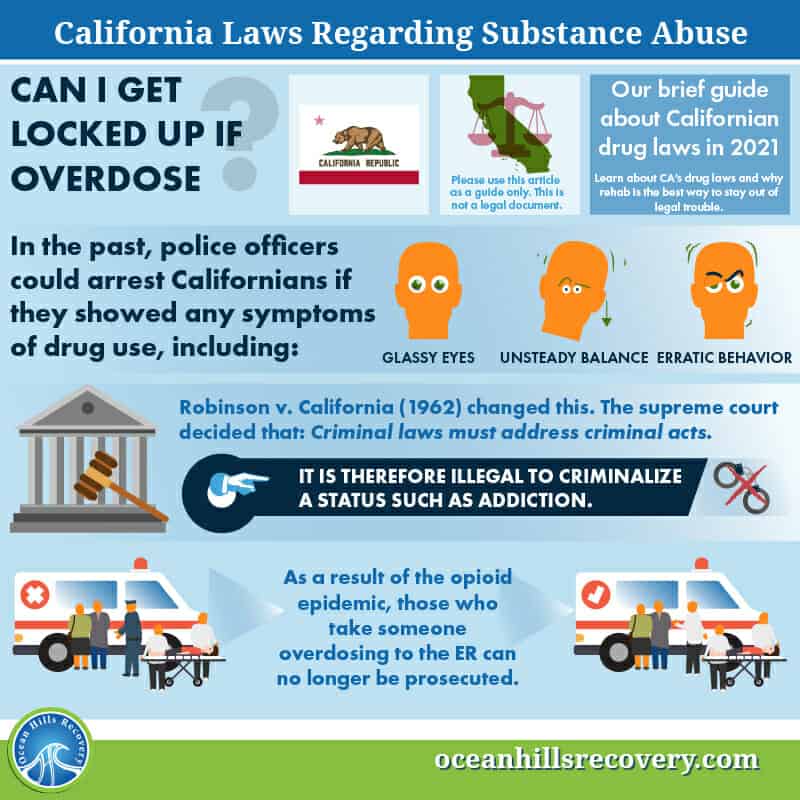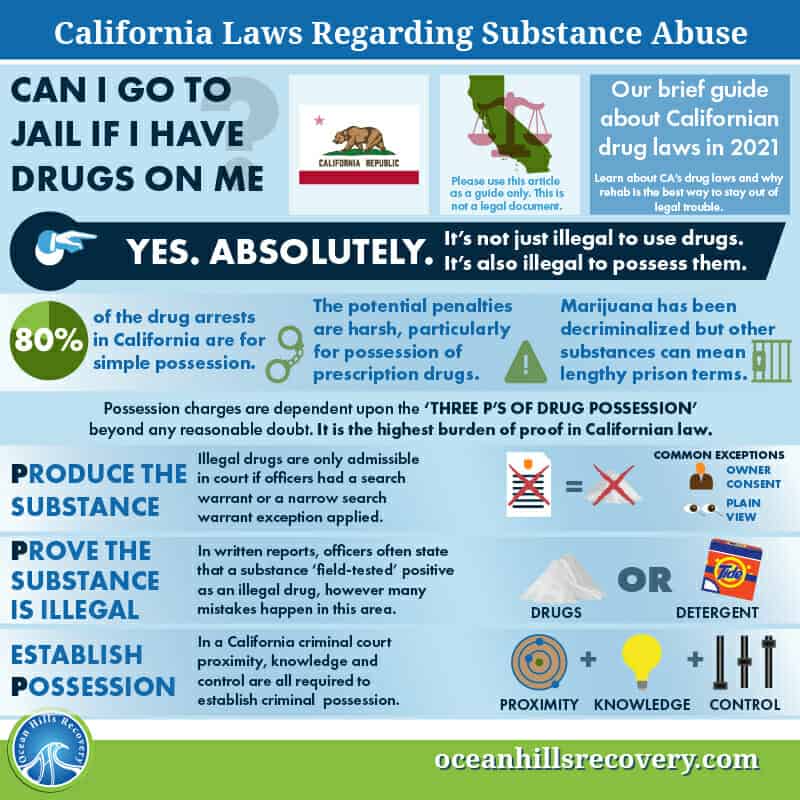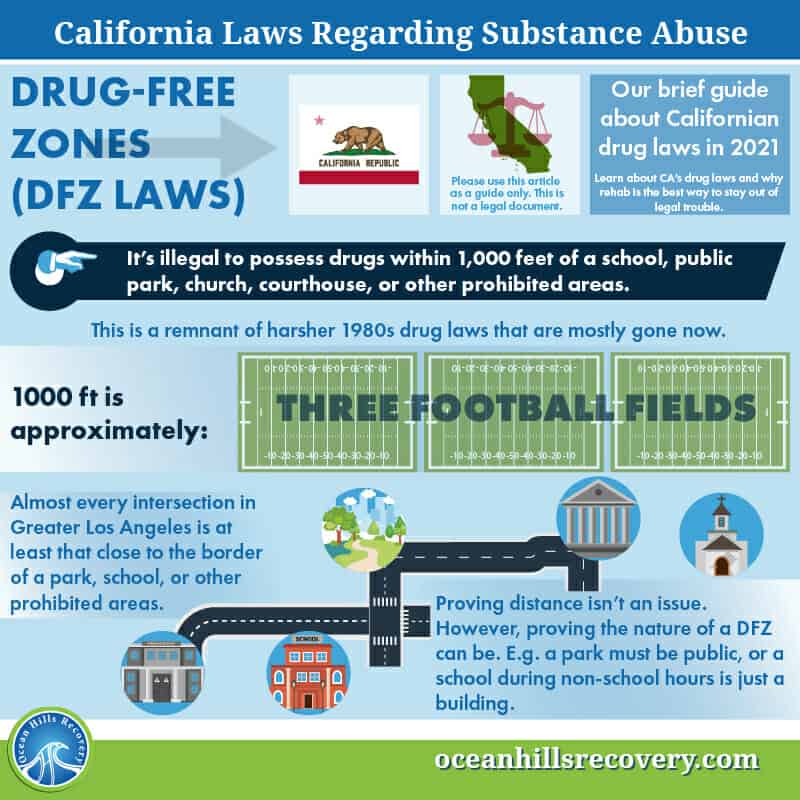Over the past several decades, California laws regarding substance abuse have changed substantially. The Fair Sentencing Act (FSA), which then-President Barack Obama signed in 2010, might be the most recent example. This law eliminated many of the harsh federal drug sentences lawmakers passed in the 1980s, including the notorious mandatory minimum sentences. The FSA and similar federal laws have had trickle-down effects on California’s substance abuse laws.
But the law doesn’t change a person’s mind when they see an employee has a strike on their record. A change in the law doesn’t necessarily translate into a change in perception. Many people still see drug users as dangerous criminals. Despite their appearances, judges are people too. So are jurors. These attitudes are especially problematic for defendants in smaller jurisdictions that do not have designated drug courts. And, as outlined below, there are still lots of harsh anti-drug laws in California.
Complete California addiction treatment involves more than physical and mental issues. Effective treatment is impossible if criminal law issues are hanging over you like a dark cloud. So, we put together a brief primer about drug laws in California based on the most common questions we hear. Although we are not lawyers, we do know how the system works. Please use this article as a guide only. For help with legal issues, please contact a reputable attorney.
Can I Get Locked Up if I Overdose?
In the past, the answer to this question was “yes.” Police officers could once arrest Californians if they showed any physical symptoms of drug use, like glassy eyes, unsteady balance, or erratic behavior.
Robinson v. California (1962) changed that. In that legal case, the Supreme Court held that criminal laws must address criminal acts. It’s illegal to criminalize a status, which in this case was drug addiction.
On a related note, until the opioid epidemic reached its peak, authorities could prosecute friends and well-wishers who took OD victims to hospitals. Lawmakers finally figured out that these individuals were doing a public service and not participating in a crime.
Can I Go to Jail if I Have Drugs On Me?
Absolutely. It’s not just illegal to use drugs. It’s also illegal to possess them. Law enforcement officers are very aggressive in this area. Over 80 percent of the drug arrests in California are for simple possession. Except for marijuana, which has been mostly decriminalized, the possible penalties in this area are pretty harsh, especially for illegal possession of prescription drugs. Even one pill could mean a lengthy prison term.
However, drug possession charges often do not hold up in court. Prosecutors must establish what many defense attorneys term the three Ps of drug possession:
Produce the Substance: Contraband, like illegal drugs or weapons, is only admissible in court if officers had a search warrant or a narrow search warrant exception applied. Officers rarely have search warrants in drug possession cases. Events happen too quickly. Standard search warrant exceptions include owner consent and plain view. Owners can give verbal consent to property searches, and if officers see something illegal in plain sight, they don’t need a warrant to confiscate it.
Prove the Substance is Illegal: In written reports, officers invariably state that a substance “field-tested” positive as an illegal drug. But mistakes abound in this area. In one of the most infamous incidents, authorities charged a Florida man with possession of heroin and put him behind bars. A subsequent chemical test proved the “heroin” was Tide laundry detergent.
Establish Possession: Proximity is only one element of possession in a California criminal court. The other two are knowledge and control. These elements are difficult to prove in a situation like an automobile stop. Just because there were drugs in the car does not mean that all occupants knew about them and exercised control over them.
The state must establish all three Ps beyond any reasonable doubt. That’s the highest burden of proof in California law.
Drug-Free Zones
A few final words about Drug-Free Zones (DFZ). California’s DFZ laws are one of the last remnants of the aforementioned harsh drug laws, which are largely gone now.
In the Golden State, it’s illegal to possess drugs within 1,000 feet of a school, public park, church, courthouse, or other prohibited areas. Technically, the DFZ law is an enhancement. If officers catch Tim with a dime bag of marijuana, he has probably not committed a crime. But if Tim was within 1,000 feet of a prohibited area, he could be changed with a serious misdemeanor.
One thousand feet is about three football fields. Almost every intersection in Greater Los Angeles is at least that close to the border of a park, school, or other prohibited areas.
So, proving distance is typically not a problem. But proving the nature of the DFZ is different. For example, the park must be a public park, at least in most cases. Shopping mall play areas and homeowners’ association-run parks usually do not count. Furthermore, children must be present at the time. During non-school hours, a school is just an empty building, at least for DFZ purposes.
Avoid Breaking the Law in California for Substance Abuse
Although California’s substance abuse laws are different now than they were a few years ago, people still get in serious trouble for using or possessing drugs. Your best bet is to avoid getting in trouble with the law altogether, by entering a California addiction treatment center.
Your California Addiction Treatment Center
At Ocean Hills Recovery, we know that each individual’s background, psychology, and substance use disorder are different. That’s why we create a program that is uniquely designed to help you or a loved one succeed in recovery. Our treatment plans include group and private therapy, as well as inpatient and outpatient care. Furthermore, we offer medically supervised detox services for patients who need to eliminate substances from their bodies.
To get help breaking free of addiction, and the legal, personal and physical problems it causes, contact our professionals at Ocean Hills Recovery today. Let our experienced, compassionate staff help you live a fulfilling life without drugs or alcohol.

















